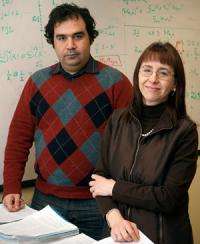'Self-correcting' gates advance quantum computing

(PhysOrg.com) -- Two Dartmouth researchers have found a way to develop more robust “quantum gates,” which are the elementary building blocks of quantum circuits. Quantum circuits, someday, will be used to operate quantum computers, super powerful computers that have the potential to perform extremely complex algorithms quickly and efficiently.
Associate Professor of Physics and Astronomy Lorenza Viola and Post-doctoral Fellow Kaveh Khodjasteh report their findings in the Feb 27, 2009 issue of Physical Review Letters. Their study is titled “Dynamically Error-Corrected Gates for Universal Quantum Computing.”
The futuristic realm of quantum computing considers units of information called quantum bits, or qubits, which can be carried by quantum-mechanical objects such as electrons or atoms. Unlike today’s computers, which use binary strings of 0s and 1s, a quantum computer uses qubits that can each be in a superposition of 0 and 1. As a result, quantum computers could efficiently solve computational problems beyond the reach of today’s computers.
“An outstanding challenge stems from the fact that quantum bits are incredibly more prone to errors than their traditional-sized counterparts,” says Viola, who is the director of Dartmouth’s Quantum Information Science Initiative. “All quantum gates, the building blocks for implementing complex quantum-mechanical circuits, are plagued by errors originating from both the interaction with the surrounding quantum environment or operational imperfections.”
Viola’s and Khodjasteh’s study showed how to construct new quantum gates that can be “dynamically corrected” out of sequences from the available faulty gates. In this manner, the researchers say, the net total error is approximately canceled.
“The key idea is to carefully exploit known relationships between unknown errors,” says Viola. “Dynamically corrected gates allow for substantially higher fidelity to be reaching quantum circuits, and can thus bring the implementation of reliable quantum-computing devices closer to reality.”
Provided by Dartmouth College
















